|
|
|
Sort Order |
|
|
|
Items / Page
|
|
|
|
|
|
|
| Srl | Item |
| 1 |
ID:
188648
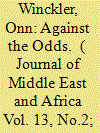

|
|
|
|
|
| Summary/Abstract |
Following independence, but particularly following the 1948–1949 Arab-Israeli War and more so in the wake of the assassination of King Abdullah I, a common prediction among both intelligence units and academics was that Jordan, at least in its initial form, namely as a sovereign political entity under the rule of the Hashemite family, would have a limited lifespan. These pessimistic projections were largely intensified following the June 1967 War and the Black September events. In retrospect, despite the high volatility of the Jordanian economy since the mid-1980s, and more so following the Iraqi invasion of Kuwait, Jordan is currently not only more politically stable than most of the other non-oil Arab countries, but also its socioeconomic situation is better. The aim of this article is twofold: first, to examine the major socioeconomic challenges that the Kingdom had to deal with that led so many to evaluate that it would not survive; and second, to explore the core socioeconomic pillars that enabled Jordan to survive. The core question that remains is, in light of the current major challenges – namely, the continuation of the Coronavirus pandemic; the continuing presence of large number of Arab Spring refugees; the ongoing instability in Syria and Iraq; the Kingdom’s high unemployment rate; and above all, the persistence of the rapid population growth – will the current rentier system work well “enough to survive” or, if not, what will the political consequences of failure be?
|
|
|
|
|
|
|
|
|
|
|
|
|
|
|
|
| 2 |
ID:
118937
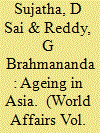

|
|
|
| 3 |
ID:
146165
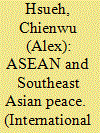

|
|
|
|
|
| Summary/Abstract |
The Southeast Asian peace literature points out at least three points of view regarding regional peace: some emphasize ASEAN's successful security management, others doubt its effectiveness, and a third body of research argues that it is achieved by a ‘capitalist peace’ trajectory. In this article, I refute the capitalist peace argument and construct a theory to bridge the two contradictory perspectives on ASEAN, arguing that the pacifying effect of ASEAN should be understood as a conditional one, which hinges on Southeast Asian countries’ economic performance. For decades, nation building and economic growth have been the main goals of Southeast Asian countries as well as the foundation to their leaders’ rule given the countries' distinct historical backgrounds. When the leaders are not able to maintain good economic performance, they tend to emphasize the nation building issues, such as provoking territorial disputes, to keep their ruling legitimacy, thus compromising ASEAN's security management. Empirical analysis of the onset of militarized interstate disputes from 1950 to 2001 confirms my argument.
|
|
|
|
|
|
|
|
|
|
|
|
|
|
|
|
| 4 |
ID:
127872
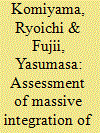

|
|
|
|
|
| Publication |
2014.
|
| Summary/Abstract |
Maximizing renewables in the country's power system has been a key political agenda in Japan after the Fukushima nuclear disaster. This paper investigates the potential of PV resource, which could be systematically integrated into the Japanese power system, using a high time-resolution optimal power generation mix model. The model allows us to explicitly consider actual PV and wind output variability in 10-min time resolution for 365 days. Simulation results show that, as PV expands, the growth of PV integration into the grid slows down when the installed PV capacity is more than the scale of the peak demand, although Japan has immense potential of installable PV capacity - equivalent to 40 times of the peak. Secondly, the results imply that a large-scale PV integration potentially decreases the usage ratio of LNG combined cycle (LNGCC) in specific seasons, which is a challenge for utility companies to ensure that LNGCC is used as a profitable compensating generator for PV variability. Finally, a sensitivity analysis on rechargeable battery cost suggests that the reason for suppressing the PV output instead of storing its surplus output by the battery can be attributed to the high battery cost; hence, the improvement of its economic performance is significant to integrate the massive PV energy.
|
|
|
|
|
|
|
|
|
|
|
|
|
|
|
|
| 5 |
ID:
092031
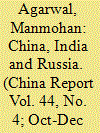

|
|
|
|
|
| Publication |
2008.
|
| Summary/Abstract |
This article analyses prospects for cooperation among Russia, India and China (RIC) in international economic governance. Section I discusses how the membership of these countries in the different international economic institutions affects their potential for cooperation. Section II analyses their recent economic performance.
|
|
|
|
|
|
|
|
|
|
|
|
|
|
|
|
| 6 |
ID:
131170


|
|
|
| 7 |
ID:
141498


|
|
|
|
|
| Summary/Abstract |
The proposition that voters reward incumbent governments that perform well economically is considered received wisdom in many democracies. We examine this hypothesis in India, a developing democracy where scholars have found limited evidence of economic voting. Using a unique state-level panel dataset covering the years 1980–2012, we find that there is no relationship between growth and electoral performance in the aggregate. However, since 2000, there do appear to be increasing electoral returns to governments that deliver higher rates of economic growth. The positive returns to growth are much larger than those to improved law and order, while inflation has no clear impact. The results suggest a significant shift in Indian voter behavior.
|
|
|
|
|
|
|
|
|
|
|
|
|
|
|
|
| 8 |
ID:
106531


|
|
|
| 9 |
ID:
125801


|
|
|
|
|
| Publication |
2013.
|
| Summary/Abstract |
Nova Scotia, Canada's community feed-in tariff (COMFIT) scheme is the world's first feed-in tariff program specifically targeting locally-based renewable energy projects. This study investigated selected turbine capacities to optimize electricity production, based on actual wind profiles for three sites in Nova Scotia, Canada (i.e., Sydney, Caribou Point, and Greenwood). The turbine capacities evaluated are also eligible under the current COMFIT-large scheme in Nova Scotia, including 100 kW, 900 kW and 2.0 MW turbines. A capital budgeting model was developed and then used to evaluate investment decisions on wind power production. Wind duration curves suggest that Caribou Point had the highest average wind speeds but for shorter durations. By comparison, Sydney and Greenwood had lower average wind speeds but with longer durations. Electricity production cost was lowest for the 2.0 MW turbine in Caribou Point ($0.07 per kWh), and highest for the 100 kW turbine located in Greenwood ($0.49 per kWh). The most financially viable wind power project was the 2.0 MW turbine assumed to operate at 80 m hub height in Caribou Point, with NPV=$251,586, and BCR=1.51. Wind power production for the remaining two sites was generally not financially feasible for the turbine capacities considered. The impact of promoting local economic development from wind power projects was higher in a scenario under which wind turbines were clustered at a single site with the highest wind resources than generating a similar level of electricity by distributing the wind turbines across multiple locations.
|
|
|
|
|
|
|
|
|
|
|
|
|
|
|
|
| 10 |
ID:
103991
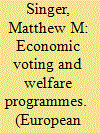

|
|
|
|
|
| Publication |
2011.
|
| Summary/Abstract |
While scholars have hypothesised that a strong welfare state should reduce voters' incentives to base their votes on economic outcomes, evidence for this proposition remains mixed. This article tests whether differences in welfare protections across American states affect the relationship between economic performance and support for the president's party in 430 state legislative elections from 1970 to 1989. Analysing the results of over 42,000 contests in which an incumbent was running for re-election, it finds that while unemployment insurance programmes do not affect the importance of economic performance, the electoral fortunes of presidential co-partisans are less strongly tied to the national economy in states with generous anti-poverty programmes. Thus by reducing vulnerability to poverty, economic safety-nets lower the salience of the economy and provide electoral cover for politicians during economic slowdowns.
|
|
|
|
|
|
|
|
|
|
|
|
|
|
|
|
| 11 |
ID:
116457
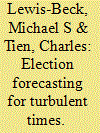

|
|
|
|
|
| Publication |
2012.
|
| Summary/Abstract |
Election forecasters face increasing turbulence in their relevant environments, making predictions more uncertain, or at least apparently so. For US presidential contests, economic performance and candidate profiles are central variables in most statistical models. These variables have exhibited large swings recently. Before the 2008 US presidential election, the economy fell into a Great Recession, and the candidate of one of the two major parties was, for the first time, a black man. These unprecedented conditions were trumpeted in the media, with heightened frenzy over the "horse race" question of who was going to win the White House. In the press, many forecasts appeared, taking different forms-polls, models, markets, pundits, to name some-offering a broader range of possible outcomes than ever before. Just looking at the predictions of the statistical modelers alone, we find that for 2008 many teams offered estimates of the incumbent (Republican) vote, ranging over an 11 percentage point spread. At one extreme, Lockerbie (2008) forecast 41.8% while at the other extreme Campbell (2008) forecast 52.7%. Of course, other methodologists offered their own, different, forecasts. The media, in its various forms, added to the hyperbole, aggressively reporting different forecasts on an almost daily basis.
|
|
|
|
|
|
|
|
|
|
|
|
|
|
|
|
| 12 |
ID:
117034
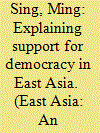

|
|
|
|
|
| Publication |
2012.
|
| Summary/Abstract |
This paper aims to explain public support for democracy in six East Asian societies using the 2006 AsiaBarometer data. The project investigates whether East Asians' support for democracy is primarily based on perceived political performance, such as satisfaction with human rights, or perceived economic performance. The work also examines whether East Asians' support for democracy is constrained by traditional values or the postmodern value of post-materialism. The analysis shows that for three democracies, satisfaction with human rights, i.e. perceived political performance and an intrinsic value embodied in democracy, counts more in shaping public support for democracy than perceived economic performance. Because support based on perceived economic performance is more volatile than support based on firm commitment to human rights, this finding sheds positive light on the prospects for democratic stability for the three East Asian democracies. For three East Asian autocratic societies, democratic support is based more on perceived economic rather than political performance, casting a pall on the future prospects for democratization of them. That said, these dim prospects are balanced by the finding of very weak and negative effects of some traditional Asian values on democratic support.
|
|
|
|
|
|
|
|
|
|
|
|
|
|
|
|
| 13 |
ID:
133653


|
|
|
|
|
| Publication |
2014.
|
| Summary/Abstract |
Empirical research in the New Institutional Economics tradition has concentrated on the degree to which institutional constraints on rulers protect property rights and foster growth through private investment. This view of institutions is overly narrow, neglecting the role of state capacity in particular. Both state authority and constraints on rulers matter for economic performance, but the relative strength of these effects depends upon a country's distance from the frontier of the world economy. Tests using a panel data set that covers up to 84 countries from the period 1960 to 2005 reveal that, in countries that have low Gross Domestic Product (GDP) per capita, constraints on rulers in the form of checks and balances affect neither the rate of productivity growth nor the growth of capital stock per worker. Basic state authority, however, has a strong, positive effect on both of these outcomes. The story is different for advanced industrial economies, where the effects of checks are positive, especially with respect to productivity growth. Institutional checks on rulers are thus not an agent of investment-based growth but support continued growth based upon innovation at the leading edge.
|
|
|
|
|
|
|
|
|
|
|
|
|
|
|
|
| 14 |
ID:
104439


|
|
|
|
|
| Publication |
2011.
|
| Summary/Abstract |
This article provides a critical survey of the resource curse-the idea that mineral and fuel abundance generates negative developmental outcomes in less developed countries. In particular, it examines the idea that mineral and fuel abundance generates growth-restricting forms of state intervention, extraordinarily large degrees of rent seeking, and corruption, which are generally argued to be negative in terms of the developmental outcomes they generate. The analysis surveys the Dutch disease, rentier state, and rent-seeking versions of the resource curse and finds they have significant shortcomings in terms of theory and evidence. It also identifies some decisive factors that help determine the blessing threshold-below which the risk of a resource curse may be very high-in mineral and fuel abundant developing countries.
|
|
|
|
|
|
|
|
|
|
|
|
|
|
|
|
| 15 |
ID:
184905


|
|
|
| 16 |
ID:
142136
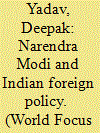

|
|
|
|
|
| Summary/Abstract |
A key advantage for India right now is that a number of countries see it as an opportunity and this moment as the right time to establish or expand relations with it. The high intensity of the government’s external engagement might be attributable to its recognition of this fact and its desire to capitalize on the interest in India. However, a question that lies ahead is: can the Modi government effectively seize the opportunity that this moment offers? A lot will depend on India’s performance, especially its economic performance. Thus, in one way a key foreign policy challenge for the Modi government will be an economic one, with foreign officials and investors asking the same question that Indian voters are: can it deliver on the promise of prosperity? The wooing will continue as long as the answer seems to be yes; if the government is not seen as meeting expectations, the apprehensions about India will start again, with countries exploring other options.
|
|
|
|
|
|
|
|
|
|
|
|
|
|
|
|
| 17 |
ID:
139924
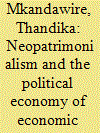

|
|
|
|
|
| Summary/Abstract |
During the past two decades, neopatrimonialism has become the convenient, all purpose, and ubiquitous moniker for African governance. The school of thought behind this research program, which the author refers to as the neopatrimonialism school, has produced an impressive literature on Africa. Its analysis informs policymakers and its language permeates media reportage on African states. While neopatrimonialism has long been a focus of development studies, in recent times it has assumed politically and economically exigent status. The school identifies causal links between neopatrimonialism and economic performance, and makes predictions drawing from what is referred to as the "logic of neopatrimonialism." Neopatrimonialism is said to account for trade policies, hyperinflation, economic stagnation, low investment in infrastructure, urban bias, andultimately, the lack of economic development in Africa. This article examines the empirical basis of predictions and policy prescriptions. It argues that while descriptive of the social practices of the states and individuals that occupy different positions within African societies, the concept of neopatrimonialism has little analytical content and no predictive value with respect to economic policy and performance.
|
|
|
|
|
|
|
|
|
|
|
|
|
|
|
|
| 18 |
ID:
140797
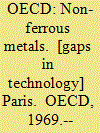

|
|
|
|
|
| Publication |
Paris, OECD, 1969.
|
| Description |
202p.: tablepbk
|
|
|
|
|
|
|
|
|
|
|
|
Copies: C:1/I:0,R:0,Q:0
Circulation
| Accession# | Call# | Current Location | Status | Policy | Location |
| 008166 | 669/OEC 008166 | Main | On Shelf | General | |
|
|
|
|
| 19 |
ID:
182776
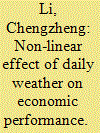

|
|
|
|
|
| Summary/Abstract |
This paper thoroughly examines the impacts of daily weather on the aggregate economic outcomes in China and identifies the underlying channels. Using within-county variations in daily weather between 1996 and 2012, we find that daily temperature and precipitation have non-linear effects on county-level economic outcomes. An additional day with an average temperature above 20 °C reduces county-level GDP by 0.05% to 0.08%, and the detrimental effects tend to intensify when the temperature rises. The precipitation does not have robust effects on county-level GDP. By examining the effects of daily weather on primary, secondary, and tertiary industries, we find that the primary industry is the main channel of the negative impacts of high temperatures. Heavy precipitation is inclined to harm agricultural output, especially grains and oil crop yields. Besides, we discover heterogeneous responses to weather extremes across counties and find suggestive evidence of adaptation.
|
|
|
|
|
|
|
|
|
|
|
|
|
|
|
|
| 20 |
ID:
107628


|
|
|
|
|
| Publication |
2011.
|
| Summary/Abstract |
Historical time trends indicate that both carbon and energy intensity have declined in the United States over the last several decades, while economic performance, as measured by per capita GSP, has improved. This observation indicates that it may be possible to reduce carbon intensity without a reduction in economic performance. This paper assesses using panel analysis, the empirical relationship between carbon emissions intensity and economic performance, and examines the direction of causality between the two variables. Data for the analysis covered 48 states, excluding Hawaii, Alaska, and Washington DC, from 1980 to 2000. The results indicate significant bi-directional relationship between carbon emissions intensity and state economic performance, both using an aggregate indicator for carbon emissions intensity, decomposed using Laspeyres indexes and disaggregated by sector. This implies that it should be possible to implement statewide and sector-specific policies to reduce energy and carbon intensity and at the same time improve economic performance.
|
|
|
|
|
|
|
|
|
|
|
|
|
|
|
|
|
|
|
|
|